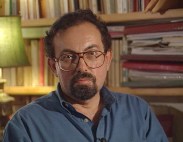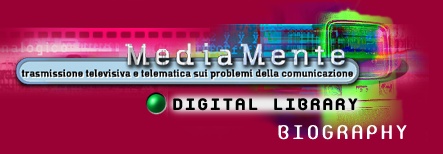 |
Aldo Mastropasqua
|
Interview
Biography
Aldo Mastropasqua was born in Bari 3 April 1948. He graduated from the University of
Rome 'La Sapienza' with a thesis on La progettazione letteraria in Elio Vittorini .
While preparing his thesis, he read and reread the Frankfurt School and in particular
Walter Benjamin by Angelus Novus, "The Work of Art in the Age of Mechanical
Reproduction" and "The Author as Producer". Walter Benjamin and his
radically anti-historical and materialist idea of literary criticism were the themes of
his first essay, Metodologia benjaminiana nella critica di Edoardo Sanguineti,
published in the first issue of the 'Quaderni di critica' review (1973) dedicated to the
neo-avant-garde. Notions such as the "loss of aura" and allegory as a method of
avant-garde writing seemed particularly functional for understanding the range of the
still unsurpassed critical inquiries of Sanguineti on Guido Gozzano which was, in the
opinion of Mastropasqua and the other founders of the 'Quaderni' (Filippo Bettini,
Marcello Carlino, Francesco Muzzioli and Giorgio Patrizi), a true turning point in the
literary historiography of the twentieth century.
In a subsequent article (in the 'Quaderni di critica' of 1976, dedicated to the
literary theories of the Frankfurt School), entitled Alcune note su Benjamin, Adorno e
la Scuola di Francoforte, he focused on the intellectual distance between Benjamin and
the Frankfurt School (if Adorno and Horkheimer, partly due to the shock of their American
experience, seemed intimidated by the confrontation with technology, Benjamin, on the
other hand, launched himself without inhibition towards a theoretical elaboration of all
that was innovative).
In the more recent essay Palazzeschi o dell'emancipazione crepuscolare (in
'Altri Termini', 4, 1991), Mastropasqua refers to the theory and the research method of
Benjamin, where, using certain observations in the unfinished Passagenwerk he
attempted to take into account the "irreducibility" of the
"twilight-liberty" of Palazzeschi in the antiornamentalist and functionalist
battle of Italian Futurism.
He has attempted to demonstrate how the direction of the narrative denounces a clear
crisis in old literary models in front of the advance of technology, as in various essays
on Vittorini, Gadda and Paolo Volponi, from those in Volponi e la scrittura
materialistica (collective volume of 'Quaderni di critica', Lithos, Rome, 1995) to
Una poetica in chiave di utopia (in the volume edited by the 'Gruppo Laboratorio,
Volponi. Letteratura come contraddizione', Angeli, Milan, 1995). According to
Mastropasqua, Volponi is the writer who in recent years has most clearly tested the crisis
in narration foreseen by Benjamin in his famous essay of 1936, The Narrator. In the
twentieth century, the siege of technology is manifested predominantly by the pressure
exerted by the mass means of communication. According to Mastropasqua the "atrophy of
experience" suffered by the writer, the artist and the musician has its most obvious
backlash in the impossibility of narrating it. "Authenticity" constantly
undermines any form of communication. There is more than a trace of this in the literary
works of Volponi from Corporale to the poems of Con testo a fronte and
Nel silenzio campale, and the last novel Le mosche del capitale. |
|

